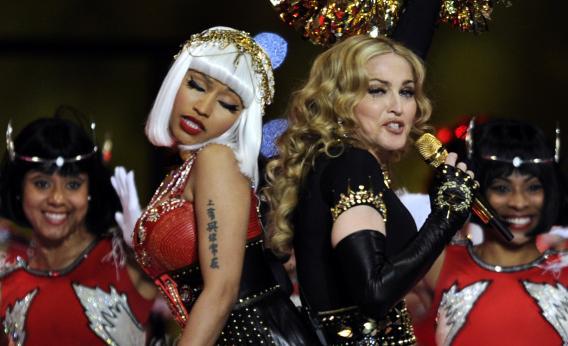By the standards of a Madonna hit, her recent single “Give Me All Your Luvin’,” featuring Nicki Minaj and M.I.A., was a minor success, best remembered for February’s Super Bowl performance featuring M.I.A.’s middle finger. But the song, which is written in a major key and with a rapid tempo, might have reached “Vogue”-like heights if it was released 50 years ago.
As compared to the late ’60s, hit pop songs today are more often written in a minor key and with a slightly slower tempo, according to a new study noted by Christopher Shea over at Wall Street Journal’s Ideas Market. Researchers at the University of Toronto and Freie Universität Berlin examined the top 40 songs on Billboard Magazine’s coveted year-end “Hot 100” chart from the last five years of every decade starting in 1965.
Between 1965 and 1969, 85 percent of the top 40 Billboard hits were written in a major key. But as the decades have passed that number has fallen dramatically: Between 2005 and 2009, only 42.5% of hits were in a major key. For the same time period, the tempo of hit songs dropped, from slightly more than 116 beats per minute to about 100.
The headline-grabbing implication of the finding is that pop music is getting sadder. Sad-sounding music tends to be in a minor key and have a slow tempo; happy-sounding music, more often than not, has the opposite characteristics. “That’s why “Give Me All Your Luvin’” sounds like a children’s song,” says psychologist Glenn Schellenberg, one of two researchers who performed the study.
For a sad-versus-happy comparison of two Billboard hits, consider Kid Cudi’s “Day ’N’ Nite” (in a minor key, with 69 beats per minute) versus the Beatles’ “Paperback Writer” (in a major key, with 158 beats per minute). Each track ended up 28th on the year-end Hot 100—in 2009 and 1966, respectively.
The paper has a second, subtler finding: Even if a modern day hit is written in a major key, it is still likely to be slower than its 1960s counterpart. This leads the authors to conclude that chart-topping pop music has become more “emotionally ambiguous,” possessing traits of both happy and sad-sounding songs. They speculate that the increased emotional ambiguity of pop music parallels similar changes in the complexity of video games, movies, and television shows. (Schellenberg says that the difference between pop music today and in the 1960s is a bit like the difference between The Sopranos and Love Boat.)
What does an emotionally ambiguous song sound like? Try Mariah Carey’s “We Belong Together,” which is in a major key, but has only 70 beats per minute, and which reached #1 on the Hot 100 in 2005. Or listen to Sarah McLachlan’s “Angel,” also in a major key and with only 39 beats per minute, which ended up 18th on the Hot 100 for 1999.
Given the researchers’ findings, it seems quite possible that The Beatles’ “Help!” (sung in a major key, with a whopping 190 beats per minute) might not have done much better on the charts today than Maddona’s “Give Me All Your Luvin.” Back in 1965, it was the seventh-most popular song of the year, after spending 13 weeks on the charts*.
*Correction, June 13, 2012: This article originally stated that Help! was at the top of the Billboard Hot 100 for 13 weeks. In fact, it was simply on the chart for 13 weeks.
